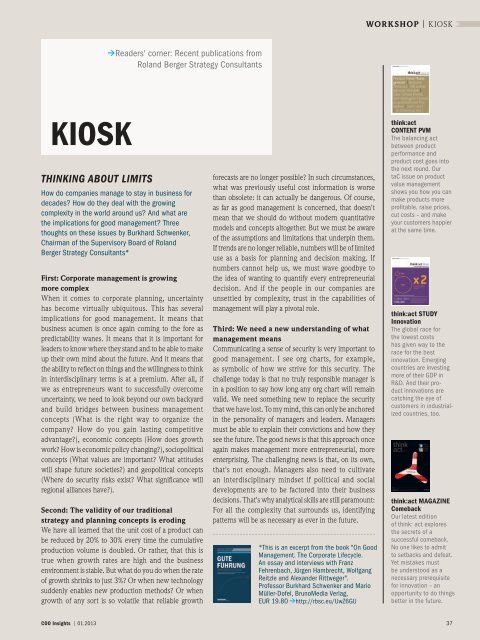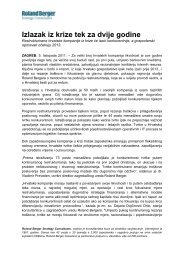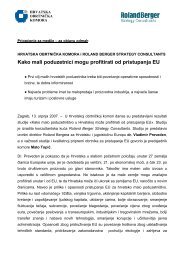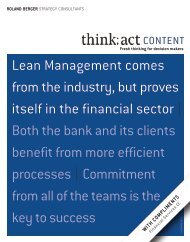COO Insights "Growth through transformation" - Roland Berger
COO Insights "Growth through transformation" - Roland Berger
COO Insights "Growth through transformation" - Roland Berger
You also want an ePaper? Increase the reach of your titles
YUMPU automatically turns print PDFs into web optimized ePapers that Google loves.
WORKSHOP | KIOSK<br />
Readers' corner: Recent publications from<br />
<strong>Roland</strong> <strong>Berger</strong> Strategy Consultants<br />
KIOSK<br />
THINKING ABOUT LIMITS<br />
How do companies manage to stay in business for<br />
decades? How do they deal with the growing<br />
complexity in the world around us? And what are<br />
the implications for good management? Three<br />
thoughts on these issues by Burkhard Schwenker,<br />
Chairman of the Supervisory Board of <strong>Roland</strong><br />
<strong>Berger</strong> Strategy Consultants*<br />
First: Corporate management is growing<br />
more complex<br />
When it comes to corporate planning, uncertainty<br />
has become virtually ubiquitous. This has several<br />
implications for good management. It means that<br />
business acumen is once again coming to the fore as<br />
predictability wanes. It means that it is important for<br />
leaders to know where they stand and to be able to make<br />
up their own mind about the future. And it means that<br />
the ability to reflect on things and the willingness to think<br />
in interdisciplinary terms is at a premium. After all, if<br />
we as entrepreneurs want to successfully overcome<br />
uncertainty, we need to look beyond our own backyard<br />
and build bridges between business management<br />
concepts (What is the right way to organize the<br />
company? How do you gain lasting competitive<br />
advantage?), economic concepts (How does growth<br />
work? How is economic policy changing?), sociopolitical<br />
concepts (What values are important? What attitudes<br />
will shape future societies?) and geopolitical concepts<br />
(Where do security risks exist? What significance will<br />
regional alliances have?).<br />
Second: The validity of our traditional<br />
strategy and planning concepts is eroding<br />
We have all learned that the unit cost of a product can<br />
be reduced by 20% to 30% every time the cumulative<br />
production volume is doubled. Or rather, that this is<br />
true when growth rates are high and the business<br />
environment is stable. But what do you do when the rate<br />
of growth shrinks to just 3%? Or when new technology<br />
suddenly enables new production methods? Or when<br />
growth of any sort is so volatile that reliable growth<br />
forecasts are no longer possible? In such circumstances,<br />
what was previously useful cost information is worse<br />
than obsolete: it can actually be dangerous. Of course,<br />
as far as good management is concerned, that doesn't<br />
mean that we should do without modern quantitative<br />
models and concepts altogether. But we must be aware<br />
of the assumptions and limitations that underpin them.<br />
If trends are no longer reliable, numbers will be of limited<br />
use as a basis for planning and decision making. If<br />
numbers cannot help us, we must wave goodbye to<br />
the idea of wanting to quantify every entrepreneurial<br />
decision. And if the people in our companies are<br />
unsettled by complexity, trust in the capabilities of<br />
management will play a pivotal role.<br />
Third: We need a new understanding of what<br />
management means<br />
Communicating a sense of security is very important to<br />
good management. I see org charts, for example,<br />
as symbolic of how we strive for this security. The<br />
challenge today is that no truly responsible manager is<br />
in a position to say how long any org chart will remain<br />
valid. We need something new to replace the security<br />
that we have lost. To my mind, this can only be anchored<br />
in the personality of managers and leaders. Managers<br />
must be able to explain their convictions and how they<br />
see the future. The good news is that this approach once<br />
again makes management more entrepreneurial, more<br />
enterprising. The challenging news is that, on its own,<br />
that's not enough. Managers also need to cultivate<br />
an interdisciplinary mindset if political and social<br />
developments are to be factored into their business<br />
decisions. That's why analytical skills are still paramount:<br />
For all the complexity that surrounds us, identifying<br />
patterns will be as necessary as ever in the future.<br />
*This is an excerpt from the book "On Good<br />
Management. The Corporate Lifecycle.<br />
An essay and interviews with Franz<br />
Fehrenbach, Jürgen Hambrecht, Wolfgang<br />
Reitzle and Alexander Rittweger".<br />
Professor Burkhard Schwenker and Mario<br />
Müller-Dofel, BrunoMedia Verlag,<br />
EUR 19.80 http://rbsc.eu/UwZ6GU<br />
think:act<br />
CONTENT PVM<br />
The balancing act<br />
between product<br />
performance and<br />
product cost goes into<br />
the next round. Our<br />
taC issue on product<br />
value management<br />
shows you how you can<br />
make products more<br />
profi table, raise prices,<br />
cut costs – and make<br />
your customers happier<br />
at the same time.<br />
think:act STUDY<br />
Innovation<br />
The global race for<br />
the lowest costs<br />
has given way to the<br />
race for the best<br />
innovation. Emerging<br />
countries are investing<br />
more of their GDP in<br />
R&D. And their product<br />
innovations are<br />
catching the eye of<br />
customers in industrialized<br />
countries, too.<br />
think:act MAGAZINE<br />
Comeback<br />
Our latest edition<br />
of think: act explores<br />
the secrets of a<br />
successful comeback.<br />
No one likes to admit<br />
to setbacks and defeat.<br />
Yet mistakes must<br />
be understood as a<br />
necessary prerequisite<br />
for innovation – an<br />
opportunity to do things<br />
better in the future.<br />
<strong>COO</strong> <strong>Insights</strong> | 01.2013<br />
37
















